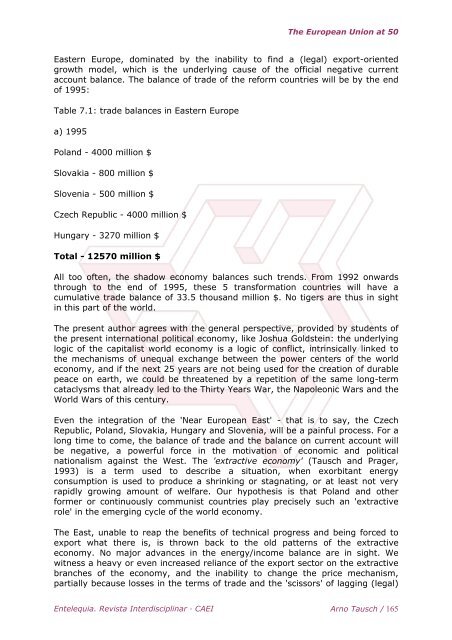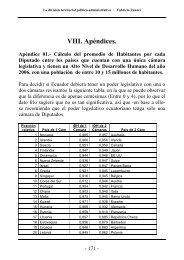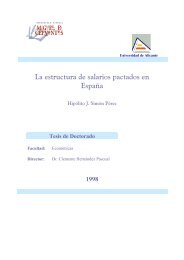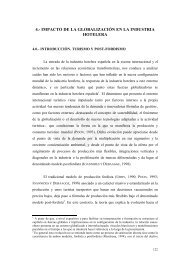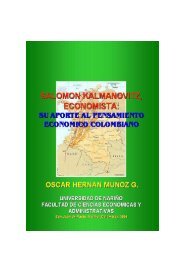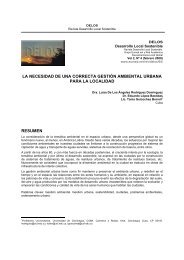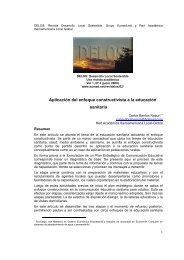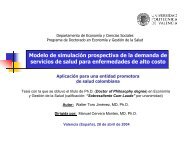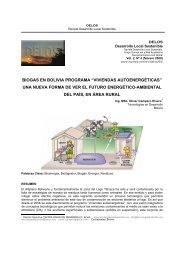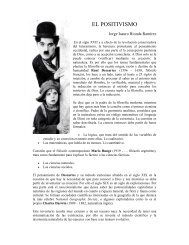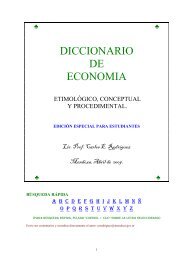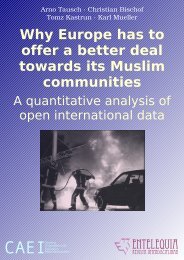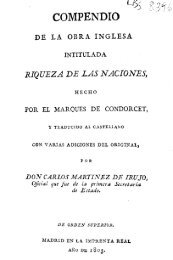Download the full book in PDF format - Eumed.net
Download the full book in PDF format - Eumed.net
Download the full book in PDF format - Eumed.net
You also want an ePaper? Increase the reach of your titles
YUMPU automatically turns print PDFs into web optimized ePapers that Google loves.
The European Union at 50<br />
Eastern Europe, dom<strong>in</strong>ated by <strong>the</strong> <strong>in</strong>ability to f<strong>in</strong>d a (legal) export-oriented<br />
growth model, which is <strong>the</strong> underly<strong>in</strong>g cause of <strong>the</strong> official negative current<br />
account balance. The balance of trade of <strong>the</strong> reform countries will be by <strong>the</strong> end<br />
of 1995:<br />
Table 7.1: trade balances <strong>in</strong> Eastern Europe<br />
a) 1995<br />
Poland - 4000 million $<br />
Slovakia - 800 million $<br />
Slovenia - 500 million $<br />
Czech Republic - 4000 million $<br />
Hungary - 3270 million $<br />
Total - 12570 million $<br />
All too often, <strong>the</strong> shadow economy balances such trends. From 1992 onwards<br />
through to <strong>the</strong> end of 1995, <strong>the</strong>se 5 trans<strong>format</strong>ion countries will have a<br />
cumulative trade balance of 33.5 thousand million $. No tigers are thus <strong>in</strong> sight<br />
<strong>in</strong> this part of <strong>the</strong> world.<br />
The present author agrees with <strong>the</strong> general perspective, provided by students of<br />
<strong>the</strong> present <strong>in</strong>ternational political economy, like Joshua Goldste<strong>in</strong>: <strong>the</strong> underly<strong>in</strong>g<br />
logic of <strong>the</strong> capitalist world economy is a logic of conflict, <strong>in</strong>tr<strong>in</strong>sically l<strong>in</strong>ked to<br />
<strong>the</strong> mechanisms of unequal exchange between <strong>the</strong> power centers of <strong>the</strong> world<br />
economy, and if <strong>the</strong> next 25 years are not be<strong>in</strong>g used for <strong>the</strong> creation of durable<br />
peace on earth, we could be threatened by a repetition of <strong>the</strong> same long-term<br />
cataclysms that already led to <strong>the</strong> Thirty Years War, <strong>the</strong> Napoleonic Wars and <strong>the</strong><br />
World Wars of this century.<br />
Even <strong>the</strong> <strong>in</strong>tegration of <strong>the</strong> 'Near European East' - that is to say, <strong>the</strong> Czech<br />
Republic, Poland, Slovakia, Hungary and Slovenia, will be a pa<strong>in</strong>ful process. For a<br />
long time to come, <strong>the</strong> balance of trade and <strong>the</strong> balance on current account will<br />
be negative, a powerful force <strong>in</strong> <strong>the</strong> motivation of economic and political<br />
nationalism aga<strong>in</strong>st <strong>the</strong> West. The 'extractive economy' (Tausch and Prager,<br />
1993) is a term used to describe a situation, when exorbitant energy<br />
consumption is used to produce a shr<strong>in</strong>k<strong>in</strong>g or stagnat<strong>in</strong>g, or at least not very<br />
rapidly grow<strong>in</strong>g amount of welfare. Our hypo<strong>the</strong>sis is that Poland and o<strong>the</strong>r<br />
former or cont<strong>in</strong>uously communist countries play precisely such an 'extractive<br />
role' <strong>in</strong> <strong>the</strong> emerg<strong>in</strong>g cycle of <strong>the</strong> world economy.<br />
The East, unable to reap <strong>the</strong> benefits of technical progress and be<strong>in</strong>g forced to<br />
export what <strong>the</strong>re is, is thrown back to <strong>the</strong> old patterns of <strong>the</strong> extractive<br />
economy. No major advances <strong>in</strong> <strong>the</strong> energy/<strong>in</strong>come balance are <strong>in</strong> sight. We<br />
witness a heavy or even <strong>in</strong>creased reliance of <strong>the</strong> export sector on <strong>the</strong> extractive<br />
branches of <strong>the</strong> economy, and <strong>the</strong> <strong>in</strong>ability to change <strong>the</strong> price mechanism,<br />
partially because losses <strong>in</strong> <strong>the</strong> terms of trade and <strong>the</strong> 'scissors' of lagg<strong>in</strong>g (legal)<br />
Entelequia. Revista Interdiscipl<strong>in</strong>ar · CAEI Arno Tausch / 165


